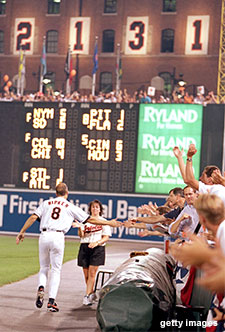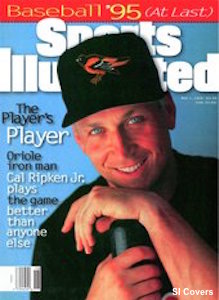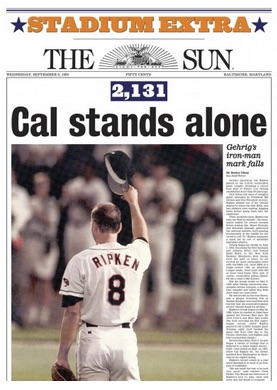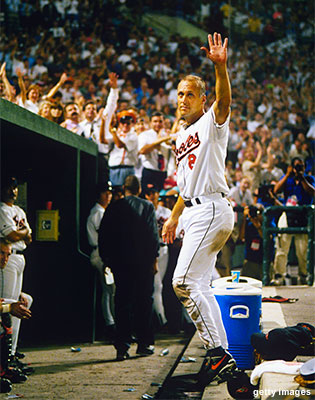September 6, 1995. My 23-year-old self had just returned from a year in Europe. I went to England to get my master's degree. At least that's what I told my parents.
The Internet was an infant. Al Gore had just given birth to it. Even though my graduate thesis was on Internet Strategy for Media Companies, it was still difficult to stay connected to people and news back home. (You have to be over 40 to remember what I'm talking about.)
While I was across the pond, there was something buzzing in Baltimore. What had been a build-up of several years was reaching its final crescendo. Cal Ripken was approaching Lou Gehrig's consecutive-games streak.
I wasn't a math major, but I had figured out the date that Cal was to break "The Streak." I had circled the first week in September on my calendar (not on my iPad, Palm Pilot, Blackberry or smartphone, but on my paper calendar). So I did what any self-respecting Baltimoron would have done: After graduating from Cambridge and backpacking through Europe, I cut short my travels to fly home in time for the festivities. Rome could wait. Athens could hold on. The only Coliseum that mattered was OPACY -- Oriole Park at Camden Yards.
The city was electric that week. I managed to get tickets for the game before he tied the record -- 2,129. The intensity at the park was palpable. Ripken fed off the energy of the packed house and national attention. He proceeded to hit a home run against Jim Abbott that day. Fandemonium ran wild.
The next day I sat at home with my parents watching my childhood icon, the local boy done good, hit another home run in his record-tying game. Clutch.

I desperately wanted to attend the record-breaking game on Sept. 6, but there was a problem -- I had no ticket. I had no ticket connections. I had no media pass (if only). There was no StubHub. I would have to go down to the stadium and try to scalp purchase a secondary ticket, in today's parlance.
I drove downtown to the stadium at 9 a.m. The start time for the game was 7:35 p.m. That gave me plenty of time to suss out a good deal. Within two minutes of walking from the parking structure toward the stadium, I was approached by someone selling a ticket. I asked how much and he said $1,500. For a poor student, that was well beyond my budget. But if I had been approached this quickly, surely there would be thousands of tickets floating around that I could make a deal on, right?
For the next ten hours I did not see another ticket being sold. There were many hundreds of people walking around with signs like "Need two" and "Will Work For Tickets" but no one was selling. Maybe the brokers were hiding in spots where only the rich people could find them. Maybe Baltimoreans weren't willing to part with a ticket to the biggest event in the city's sporting history.
There was no transparency around ticket scalping back then. No way to easily and efficiently connect buyers and sellers. A handful of years later my friend and former colleague, Eric Baker, founded StubHub. I signed on as an early investor and advisor because of my frustrating experience on this day.
The intensity outside the stadium was building. The stadium was filling up and I was out of luck. I was not getting a ticket to this game. Dejected, I walked to the pay phone located next to the ticket booth and called my parents: "Start the VCR. I didn't get a ticket. I'm coming home."

I turned the corner walking past the Warehouse to get to my parking lot. Out of the corner of my eye, I saw a man come out of an official office wearing an orange Oriole polo shirt holding a white envelope in his left hand. Not knowing who he was or what was in his hand, I tried one last flier. I walked over to him and said, "Sir, I'll give you $150 for one of those tickets in your envelope."
He stared at me for a few seconds, nodded his head, and said come with me. We walked around the corner. I handed him the crisp bills and he handed me my golden ticket. To this day I don't know who he was, but for this Baltimore kid, he was Santa Claus and Christmas came early.
I walked right back to the pay phone to tell my parents that I miraculously got a ticket and that I would see them after the game. I walked in right as the lineups were being announced.
In the fourth inning, Ripken hit yet another home run. His third consecutive game. And when the game become official and the banner in right field was flipped to 2,131, they cued the John Tesh music.
I stood in awe with 46,272 fans as Ripken basked in the glow of his ultimate achievement. The love, admiration and warmth in that stadium during the 22-minute standing ovation is a feeling I will never forget. It drew me to sports and is one of the main reasons I work in this industry today. Sports is uniquely powerful in its ability to bring a community together for shared experiences that bond.
My connection to Calvin Edwin Ripken Jr. was stronger than that of your typical fan. Not only was he a local product whose father managed the Orioles and whose brother played second base for the Birds, but I also had the privilege of working for Ripken's longtime agent, Ron Shapiro. I shadowed Shapiro during the summer of 1992 when Cal was in a contract year and there was a question if he would re-sign with the franchise. That summer I got my "Ph.D." in sports management.
Breaking the streak was always going to be an epic local story, but it resonated far beyond the state of Maryland.

"It connected with baseball fans because Cal was doing the impossible -- breaking the streak of the iconic Lou Gehrig," Shapiro said. "And it extended beyond the baseball field and baseball fans because it embodied the ultimate of the American work ethic -- showing up everyday and getting the job done. It also didn't hurt that Cal was a softspoken and humble record-breaker. A stark contrast to so many sports heroes of this era."
And the timing of this achievement, while coincidental, elevated its importance.
"The benefit to baseball of Cal doing what he did when he did it is incalculable," Shapiro said. "After the strike scarred year of 1994 and its lingering negative after effects, the drama of Cal's march to the record and the streak truly captivated the public and brought many fans back to the Game and created new fans. It certainly justified the description of Cal as the ‘Man Who Saved Baseball'."
Cal Ripken went on to play another 501 consecutive games after breaking the record. And most remarkably during this streak, he at one point played in 8,243 consecutive innings. That's more than 5 ½ seasons without missing a single inning.
Of all of the great moments in sports that I've been fortunate to attend, this one is the most memorable. It's astonishing to me that it was 20 years ago. The world is a different place. The way we communicate has been transformed. I wrote this on my laptop, proofed it on my iPad, texted with my editor, emailed Cal's agent from my iPhone, all while checking out video clips of that day on YouTube via my high-speed WiFi.
But despite these changing times, the lessons we learned from Ripken's feat remain timeless. Thank you, Cal.
-- David Katz is founder and CEO of ThePostGame.com. Follow him on Twitter @katzmando.





